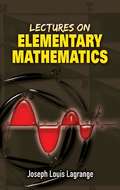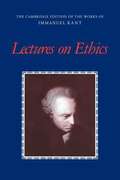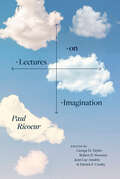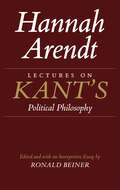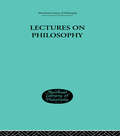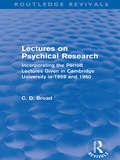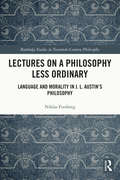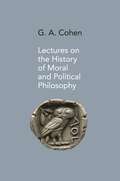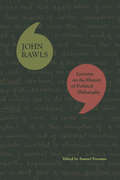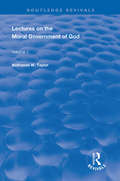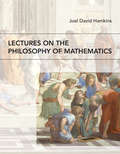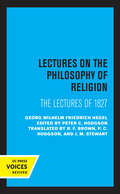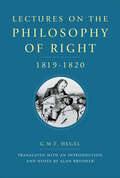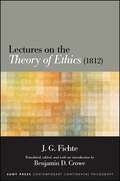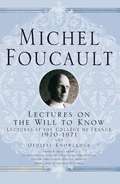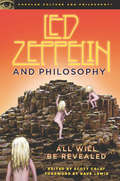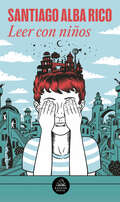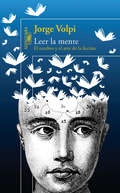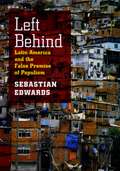- Table View
- List View
Lectures on Anthropology
by Immanuel Kant Allen W. Wood Robert B. Louden Allen W. Wood Robert R. Clewis Robert B. Louden G. Felicitas Munzel Immanuel Kant Robert B. Louden Allen W. Wood Robert R. Clewis G. Felicitas MunzelKant was one of the inventors of anthropology, and his lectures on anthropology were the most popular and among the most frequently given of his lecture courses. This volume contains the first translation of selections from student transcriptions of the lectures between 1772 and 1789, prior to the published version, Anthropology from a Pragmatic Point of View (1798), which Kant edited himself at the end of his teaching career. The two most extensive texts, Anthropology Friedländer (1772) and Anthropology Mrongovius (1786), are presented here in their entirety, along with selections from all the other lecture transcriptions published in the Academy edition, together with sizeable portions of the Menschenkunde (1781–1782), first published in 1831. These lectures show that Kant had a coherent and well-developed empirical theory of human nature bearing on many other aspects of his philosophy, including cognition, moral psychology, politics and philosophy of history.
Lectures on Elementary Mathematics (Dover Books on Mathematics)
by Joseph Louis LagrangeOne of the eighteenth century's greatest mathematicians, Lagrange made significant contributions to all fields of analysis and number theory. He survived the French Revolution to deliver these lectures in 1795 at the École Normale, a training school for teachers. An exemplar among elementary expositions, Lagrange's talks feature both originality of thought and elegance of expression.The five lectures begin with discussions of arithmetic that focus on fractions and logarithms as well as theory and applications. Subsequent talks consider algebra, with emphasis on the resolution of equations of the third and fourth degree, the resolution of numerical equations, and the employment of curves in the solution of problems. Students, teachers, and others with an interest in mathematics will find this volume a unique reading book in mathematics, with fascinating historical and philosophical remarks by a distinguished mathematician.
Lectures on Ethics
by Immanuel Kant Peter Heath J. B. SchneewindThis volume contains four versions of the lecture notes taken by Kant's students of his university courses in ethics given regularly over a period of some thirty years. The notes are very complete and expound not only Kant's views on ethics but many of his opinions on life and human nature. Much of this material has never before been translated into English. As with other volumes in the series, there are copious linguistic and explanatory notes and a glossary of key terms.
Lectures on Imagination
by Paul RicoeurRicoeur’s theory of productive imagination in previously unpublished lectures. The eminent philosopher Paul Ricoeur was devoted to the imagination. These previously unpublished lectures offer Ricoeur’s most significant and sustained reflections on creativity as he builds a new theory of imagination through close examination, moving from Aristotle, Pascal, Spinoza, Hume, and Kant to Ryle, Price, Wittgenstein, Husserl, and Sartre. These thinkers, he contends, underestimate humanity’s creative capacity. While the Western tradition generally views imagination as derived from the reproductive example of the image, Ricoeur develops a theory about the mind’s power to produce new realities. Modeled most clearly in fiction, this productive imagination, Ricoeur argues, is available across conceptual domains. His theory provocatively suggests that we are not constrained by existing political, social, and scientific structures. Rather, our imaginations have the power to break through our conceptual horizons and remake the world.
Lectures on Infinitary Model Theory
by David MarkerInfinitary logic, the logic of languages with infinitely long conjunctions, plays an important role in model theory, recursion theory and descriptive set theory. This book is the first modern introduction to the subject in forty years, and will bring students and researchers in all areas of mathematical logic up to the threshold of modern research. The classical topics of back-and-forth systems, model existence techniques, indiscernibles and end extensions are covered before more modern topics are surveyed. Zilber's categoricity theorem for quasiminimal excellent classes is proved and an application is given to covers of multiplicative groups. Infinitary methods are also used to study uncountable models of counterexamples to Vaught's conjecture, and effective aspects of infinitary model theory are reviewed, including an introduction to Montalbán's recent work on spectra of Vaught counterexamples. Self-contained introductions to effective descriptive set theory and hyperarithmetic theory are provided, as is an appendix on admissible model theory.
Lectures on Kant's Political Philosophy
by Hannah Arendt edited by Ronald BeinerHannah Arendt's last philosophical work was an intended three-part project entitled The Life of the Mind. Unfortunately, Arendt lived to complete only the first two parts, Thinking and Willing. Of the third, Judging, only the title page, with epigraphs from Cato and Goethe, was found after her death. As the titles suggest, Arendt conceived of her work as roughly parallel to the three Critiques of Immanuel Kant. In fact, while she began work on The Life of the Mind, Arendt lectured on "Kant's Political Philosophy," using the Critique of Judgment as her main text. The present volume brings Arendt's notes for these lectures together with other of her texts on the topic of judging and provides important clues to the likely direction of Arendt's thinking in this area.
Lectures on Kant's Political Philosophy
by Hannah ArendtHannah Arendt's last philosophical work was an intended three-part project entitled The Life of the Mind. Unfortunately, Arendt lived to complete only the first two parts, Thinking and Willing. Of the third, Judging, only the title page, with epigraphs from Cato and Goethe, was found after her death. As the titles suggest, Arendt conceived of her work as roughly parallel to the three Critiques of Immanuel Kant. In fact, while she began work on The Life of the Mind, Arendt lectured on "Kant's Political Philosophy," using the Critique of Judgment as her main text. The present volume brings Arendt's notes for these lectures together with other of her texts on the topic of judging and provides important clues to the likely direction of Arendt's thinking in this area.
Lectures on Philosophy
by George Edward MooreThis is Volume XV in a collection of twenty-two on 20th Century Philosophy. First published in 1966, as a part of the Muirhead library of Philosophy this work consists of selections from three courses of lectures. The first course was given in the academic year 1925-26, the second in 1928-29, and the third in 1933-34. The first two (entitled “ Metaphysics” ) were intended primarily for Part II of the Moral Sciences Tripos; the last (entitled “ Elements of Philosophy” ) for Part I. (The selections from the second course, which are the most extensive, are printed first.)
Lectures on Psychical Research: Incorporating the Perrott Lectures Given in Cambridge University in 1959 and 1960 (Routledge Revivals)
by C. D. BroadThis book, first published in 1962, is based on a series of lectures first given at Cambridge University in 1959 and 1960, dealing with 'psychical research' - i.e. the scientific investigation of ostensibly paranormal phenomena. Split into three sections, Professor Broad's study examines numerous issues relating to psychical theory, including guessing, hallucinatory quasi-perception and trance-mediumship.
Lectures on a Philosophy Less Ordinary: Language and Morality in J.L. Austin’s Philosophy (Routledge Studies in Twentieth-Century Philosophy)
by Niklas ForsbergThis book offers a comprehensive reinterpretation of J.L. Austin’s philosophy. It opens new ways of thinking about ethics and other contemporary issues in the wake of Austin’s philosophical work. Austin is primarily viewed as a philosopher of language whose work focused on the pragmatic aspects of speech. His work on ordinary language philosophy and speech act theory is seen as his main contribution to philosophy. This book challenges this received view to show that Austin used his most well-known theoretical notions as heuristic tools aimed at debunking the fact/value dichotomy. Additionally, it demonstrates that Austin’s continual returns to the ordinary is rooted in a desire to show that our lives in language are complicated and multifaceted. What emerges is an attempt to think with Austin about problems that are central to philosophy today—such as the question about linguistic inheritance, truth, the relationship between a language inherited and morality, and how we are to cope with linguistic elasticity and historicity. Lectures on a Philosophy Less Ordinary will appeal to scholars and advanced students working on Austin’s philosophy, philosophy of language, and the history of analytic philosophy.
Lectures on the History of Moral and Political Philosophy
by Jonathan Wolff G. A. CohenPreviously unpublished writings from one of the most important political philosophers of recent timesG. A. Cohen was one of the leading political philosophers of recent times. He first came to wide attention in 1978 with the prize-winning book Karl Marx's Theory of History: A Defence. In subsequent decades his published writings largely turned away from the history of philosophy, focusing instead on equality, freedom, and justice. However, throughout his career he regularly lectured on a wide range of moral and political philosophers of the past. This volume collects these previously unpublished lectures.Starting with a chapter centered on Plato, but also discussing the pre-Socratics as well as Aristotle, the book moves to social contract theory as discussed by Hobbes, Locke, and Hume, and then continues with chapters on Kant, Hegel, and Nietzsche. The book also contains some previously published but uncollected papers on Marx, Hobbes, and Kant, among other figures. The collection concludes with a memoir of Cohen written by the volume editor, Jonathan Wolff, who was a student of Cohen's.A hallmark of the lectures is Cohen's engagement with the thinkers he discusses. Rather than simply trying to render their thought accessible to the modern reader, he tests whether their arguments and positions are clear, sound, and free from contradiction. Throughout, he homes in on central issues and provides fresh approaches to the philosophers he examines. Ultimately, these lectures teach us not only about some of the great thinkers in the history of moral and political philosophy, but also about one of the great thinkers of our time: Cohen himself.
Lectures on the History of Political Philosophy
by John Rawls Samuel FreemanThis last book by the late John Rawls, derived from written lectures and notes for his long-running course on modern political philosophy, offers readers an account of the liberal political tradition from a scholar viewed by many as the greatest contemporary exponent of the philosophy behind that tradition. <p><p> Rawls's goal in the lectures was, he wrote, "to identify the more central features of liberalism as expressing a political conception of justice when liberalism is viewed from within the tradition of democratic constitutionalism." He does this by looking at several strands that make up the liberal and democratic constitutional traditions, and at the historical figures who best represent these strands--among them the contractarians Hobbes, Locke, and Rousseau; the utilitarians Hume, Sidgwick, and J. S. Mill; and Marx regarded as a critic of liberalism. Rawls's lectures on Bishop Joseph Butler also are included in an appendix. Constantly revised and refined over three decades, Rawls's lectures on these figures reflect his developing and changing views on the history of liberalism and democracy--as well as how he saw his own work in relation to those traditions. <p> With its clear and careful analyses of the doctrine of the social contract, utilitarianism, and socialism--and of their most influential proponents--this volume has a critical place in the traditions it expounds. Marked by Rawls's characteristic patience and curiosity, and scrupulously edited by his student and teaching assistant, Samuel Freeman, these lectures are a fitting final addition to his oeuvre, and to the history of political philosophy as well.
Lectures on the History of Political Philosophy
by John RawlsThis last book by the late John Rawls, derived from written lectures and notes for his long-running course on modern political philosophy, offers readers an account of the liberal political tradition from a scholar viewed by many as the greatest contemporary exponent of the philosophy behind that tradition. Rawls’s goal in the lectures was, he wrote, “to identify the more central features of liberalism as expressing a political conception of justice when liberalism is viewed from within the tradition of democratic constitutionalism.” He does this by looking at several strands that make up the liberal and democratic constitutional traditions, and at the historical figures who best represent these strands—among them the contractarians Hobbes, Locke, and Rousseau; the utilitarians Hume, Sidgwick, and J. S. Mill; and Marx regarded as a critic of liberalism. Rawls’s lectures on Bishop Joseph Butler also are included in an appendix. Constantly revised and refined over three decades, Rawls’s lectures on these figures reflect his developing and changing views on the history of liberalism and democracy—as well as how he saw his own work in relation to those traditions. With its clear and careful analyses of the doctrine of the social contract, utilitarianism, and socialism—and of their most influential proponents—this volume has a critical place in the traditions it expounds. Marked by Rawls’s characteristic patience and curiosity, and scrupulously edited by his student and teaching assistant, Samuel Freeman, these lectures are a fitting final addition to his oeuvre, and to the history of political philosophy as well.
Lectures on the Moral Government of God (Routledge Revivals)
by Nathaniel W. TaylorOriginally compiled in 1859, this book is a collection of Nathaniel Taylor's lectures considering the moral government of God. The moral government of god was the great thought of Dr. Taylor's intellect, and the favourite theme of his instructons in theology; to vindicate the ways of God to man, was the object to which all Dr Taylor's energies were consecrated. This collection presents a complete and connected view of all that he wrote on this fundamental topic in theology, and to the lectures on moral government have been appended other essays and lectures on subjects that are naturally connected with this.
Lectures on the Philosophy of Mathematics
by Joel David HamkinsAn introduction to the philosophy of mathematics grounded in mathematics and motivated by mathematical inquiry and practice.In this book, Joel David Hamkins offers an introduction to the philosophy of mathematics that is grounded in mathematics and motivated by mathematical inquiry and practice. He treats philosophical issues as they arise organically in mathematics, discussing such topics as platonism, realism, logicism, structuralism, formalism, infinity, and intuitionism in mathematical contexts. He organizes the book by mathematical themes--numbers, rigor, geometry, proof, computability, incompleteness, and set theory--that give rise again and again to philosophical considerations.
Lectures on the Philosophy of Religion: The Lectures of 1827
by Georg Wilhelm HegelThis title is part of UC Press's Voices Revived program, which commemorates University of California Press’s mission to seek out and cultivate the brightest minds and give them voice, reach, and impact. Drawing on a backlist dating to 1893, Voices Revived makes high-quality, peer-reviewed scholarship accessible once again using print-on-demand technology. This title was originally published in 1988.
Lectures on the Philosophy of Right, 1819–1820
by G.W.F. HegelPublished in 1821, Outlines of the Philosophy of Right is considered the definitive articulation of the legal, moral, social, and political philosophy of G.W.F. Hegel. However, shortly before its publication, Hegel delivered a series of lectures on the subject matter of the work at the University of Berlin. These lectures are unlike any others Hegel gave on the philosophy of Right in that they do not supplement a published text but rather give a full and independent presentation of his mature political thought. Yet, they are also unlike Hegel’s formal treatise in that they form a smooth and flowing discourse, much like Hegel’s lectures on the philosophy of history, philosophy of art, philosophy of religion, and history of philosophy. Substantively, these lectures contain more extensive discussions of poverty and the proletariat than are found in Hegel’s published text – discussions that carry out the retreat from optimism about the present age intimated in the preface to Outlines but nowhere evident in the text itself. Translated with an introduction and notes by Alan Brudner, Hegel’s 1819/20 lectures on the philosophy of Right present his complete thoughts on law and the state in a manner that is more accessible and engaging than any other Hegelian text on these subjects.
Lectures on the Theory of Ethics (SUNY series in Contemporary Continental Philosophy)
by J. G. FichteTranslated here for the first time into English, this text furnishes a new window into the final phase of Fichte's career. Delivered in the summer of 1812 at the newly founded University of Berlin, Fichte's lectures on ethics explore some of the key concepts and issues in his evolving system of radical idealism. Addressing moral theory, the theory of education, the philosophy of history, and the philosophy of religion, Fichte engages both directly and indirectly with some of his most important contemporaries and philosophical rivals, including Kant, Schelling, and Hegel. Benjamin D. Crowe's translation includes extensive annotations and a German-English glossary. His introduction situates the text systematically, historically, and institutionally within an era of cultural ferment and intellectual experimentation, and includes a bibliography of recent scholarship on Fichte's moral theory and on the final period of his career.
Lectures on the Will to Know: Lectures at the College De France 1970–1971 and Oedipal Knowledge
by Daniel DefertLectures on the Will to Know reminds us that Michel Foucault's work only ever had one object: truth. Here, he builds on his earlier work, Discipline and Punish, to explore the relationship between tragedy, conflict, and truth-telling. He also explores the different forms of truth-telling, and their relation to power and the law. The publication of Lectures on the Will to Know marks a milestone in Foucault's reception, and it will no longer be possible to read him in the same way as before.
Lectures on the Will to Know: Lectures at the College de France 1970-1971 and Oedipal Knowledge
by Michel Foucault Graham Burchell Daniel DefertIn the first of his annual series of lectures at the Collège de France, Foucault develops a vigorous Nietzschean history of the will to know through an analysis of changing procedures of truth, legal forms, and class struggles in ancient Greece.
Led Zeppelin and Philosophy
by Scott CalefLed Zeppelin, who bestrode the world of rock like a colossus, have continually grown in popularity and influence since their official winding up in 1980. They exasperated critics and eluded classification, synthesizing blues, rock, folk, rockabilly, funk, classical, country, Indian, and Arabic techniques. They performed the alchemical trick of transmuting base led into gold-and platinum-and diamond. They did what they would, finding wisdom through personal excess and artistic self-discipline. "Not a coda to Zeppelin's legacy, but a blast of metaphysical graffiti as relevant today as the first time we heard the opening chords of 'Stairway to Heaven'. From Kant to 'Kashmir', from Freud to 'Fool in the Rain', Calef and company explore Zeppelin's music in an introspective, suggestive manner worthy of both a blistering Page solo and a bawdy Bonham stomp." -BRANDON W. FORBES, co-editor of Radiohead and Philosophy"Led Zeppelin's albums, personalities, live performances, art work, myths, influences, and more, all come under the microscope. Compelling insights and observations add more depth to a subject that continues to thrill and inspire. Each chapter is driven by an unquenchable thirst for Zeppelin knowledge and pulls the reader deeper into the world of Led Zeppelin . . ." -DAVE LEWIS, editor, Tight But Loose
Leer con niños
by Santiago Alba RicoUn libro puede cambiar el mundo. Freud convenció a la tradición literaria occidental de que todos los niños quieren matar a sus padres cuando lo que en realidad nos cuenta la historia de Edipo -como varias decenas de mitos y relatos populares- es, al revés, que son los padres, o al menos los reyes, los que quieren matar, devorar o abandonar a sus hijos. Este libro, que cabalga entre el ensayo y la ficción, parte de una experiencia singular: la lectura compartida de la literatura sin etiquetas: Homero, Dickens, Canetti, Dante, Salinger... A partir de ahí plantea y responde a dos preguntas inseparables: «¿Para qué sirven los niños?» y «¿Para qué sirven los libros?». En una sociedad dominada por «solteros sin imaginación», en la que la infancia, exaltada en un escaparate, se ha vuelto más vulnerable que nunca y en la que la discontinuidad del niño y la continuidad del relato están radicalmente amenazadas, Santiago AlbaRico reivindica una especie de nuevo compromiso «materno» que una, como en la experiencia de Sherezade, los Cuentos y los Niños. De ello depende la educación, no de Edipo, sino de Layo; es decir, la educación de los asesinos. La crítica ha dicho...«Leer con niños va de niños y de libros, pero mucho más del niño que los adultos llevamos dentro, sin que falte el adulto que los niños llevan dentro.»El Mundo «Habla de la gente que defiende su tiempo para leer, de la vida en una época bárbara que pretende acabar con los relatos de carne y hueso, de las nuevas formas virtuales de dominación, de la pobreza, de las prisas crueles de un capitalismo que nos impone hábitos de solteros y de huérfanos.»Luís García Montero «Un libro cautivador y excitante, repleto de destellos: un libro valientemente interpelador en el que destacan las observaciones muy delicadas sobre los niños, fruto de una atención apasionada y amorosa.»IgnacioEchevarría, El Mercurio «Un libro delicado y brutal sobre para qué sirven los niños y, por lo tanto, para qué sirve la diferencia entre lo bueno y lo malo, lo horrible y lo maravilloso. Un libro necesario cuando esas diferencias parecen confusas a tantas personas.»Belén Gopegui «Tras muchos años de haber combatido la escuela y la familia como aparatos de reproducción ideológica, este libro vuelve a reivindicarlas desde la izquierda como espacios de resistencia.»Rebelión.org «Este ensayo sobre el papel de la literatura y la educación en la jungla salvaje del capitalismo contiene pistas impagables y preguntas inquietantes.»Javier Rodríguez Marcos, El País «Leer con niños [...] fluctúa entre el ensayo, la literatura, el periodismo y la autobiografía con una fluidez deslumbrante.»Darwin Palermo «Leer con niños es un tratado puro (y a veces duro) de ética y filosofía política, pero animado por un contagioso ritmo literario.»Alba Rico, Babelia, El País
Leer con niños
by Santiago Alba RicoUn libro puede cambiar el mundo. Freud convenció a la tradición literaria occidental de que todos los niños quieren matar a sus padres cuando lo que en realidad nos cuenta la historia de Edipo -como varias decenas de mitos y relatos populares- es, al revés, que son los padres, o al menos los reyes, los que quieren matar, devorar o abandonar a sus hijos. Este libro, que cabalga entre el ensayo y la ficción, parte de una experiencia singular: la lectura compartida de la literatura sin etiquetas: Homero, Dickens, Canetti, Dante, Salinger... A partir de ahí plantea y responde a dos preguntas inseparables: «¿Para qué sirven los niños?» y «¿Para qué sirven los libros?». En una sociedad dominada por «solteros sin imaginación», en la que la infancia, exaltada en un escaparate, se ha vuelto más vulnerable que nunca y en la que la discontinuidad del niño y la continuidad del relato están radicalmente amenazadas, Santiago Alba Rico reivindica una especie de nuevo compromiso «materno» que una, como en la experiencia de Sherezade, los Cuentos y los Niños. De ello depende la educación, no de Edipo, sino de Layo; es decir, la educación de los asesinos. La crítica ha dicho...«Leer con niños va de niños y de libros, pero mucho más del niño que los adultos llevamos dentro, sin que falte el adulto que los niños llevan dentro.»El Mundo«Habla de la gente que defiende su tiempo para leer, de la vida en una época bárbara que pretende acabar con los relatos de carne y hueso, de las nuevas formas virtuales de dominación, de la pobreza, de las prisas crueles de un capitalismo que nos impone hábitos de solteros y de huérfanos.»Luís García Montero «Un libro cautivador y excitante, repleto de destellos: un libro valientemente interpelador en el que destacan las observaciones muy delicadas sobre los niños, fruto de una atención apasionada y amorosa.»Ignacio Echevarría, El Mercurio «Un libro delicado y brutal sobre para qué sirven los niños y, por lo tanto, para qué sirve la diferencia entre lo bueno y lo malo, lo horrible y lo maravilloso. Un libro necesario cuando esas diferencias parecen confusas a tantas personas.»Belén Gopegui «Tras muchos años de haber combatido la escuela y la familia como aparatos de reproducción ideológica, este libro vuelve a reivindicarlas desde la izquierda como espacios de resistencia.»Rebelión.org «Este ensayo sobre el papel de la literatura y la educación en la jungla salvaje del capitalismo contiene pistas impagables y preguntas inquietantes.»Javier Rodríguez Marcos, El País«Leer con niños [...] fluctúa entre el ensayo, la literatura, el periodismo y la autobiografía con una fluidez deslumbrante.»Darwin Palermo «Leer con niños es un tratado puro (y a veces duro) de ética y filosofía política, pero animado por un contagioso ritmo literario.»Alba Rico, Babelia, El País
Leer la mente: El cerebro y el arte de la ficción
by Jorge VolpiEn este brillante y provocador ensayo, Jorge Volpi destierra la vieja idea de la ficción como entretenimiento y sostiene, por el contrario, que las novelas y los cuentos han sido esenciales para la evolución de la especie humana. Del reconocido escritor Jorge Volpi, autor de No será la Tierra y ganador del Premio Iberoamericano José Donoso por el conjunto de su obra. Un brillante y provocador ensayo, donde Jorge Volpi entrelaza ciencia y literatura y demuestra que todos somos ficciones y que la literatura es una de las claves de nuestra identidad individual y nuestras pasiones compartidas. ¿Qué pasa en mi cerebro cuando leo una novela o un cuento? ¿Cómo y cuándo aparecieron? ¿Qué parte de la mente inventa las anécdotas felices o los desenlaces trágicos? ¿Por qué sufrimos o gozamos con los personajes de los relatos y de qué forma nosotros, los lectores, nos transformamos en esos personajes? ¿No es acaso el yo nuestra mayor invención? Del descubrimiento de las neuronas espejo al origen de la conciencia y las emociones, y de las trampas de la memoria a los laberintos de la inteligencia, el autor de En busca de Klingsor y No será la Tierra, Jorge Volpi, refrenda su voluntad de entrelazar ciencia y literatura. Al final, Leer la mente demuestra que todos somos ficciones y que la literatura es una de las claves de nuestra identidad individual y nuestras pasiones compartidas.
Left Behind: Latin America and the False Promise of Populism
by Sebastian EdwardsThe political and economic history of Latin America has been marked by great hopes and even greater disappointments. Despite abundant resources--and a history of productivity and wealth--in recent decades the region has fallen further and further behind developed nations, surpassed even by other developing economies in Southeast Asia and elsewhere. In Left Behind, Sebastian Edwards explains why the nations of Latin America have failed to share in the fruits of globalization and forcefully highlights the dangers of the recent turn to economic populism in the region. He begins by detailing the many ways Latin American governments have stifled economic development over the years through excessive regulation, currency manipulation, and thoroughgoing corruption. He then turns to the neoliberal reforms of the early 1990s, which called for the elimination of deficits, lowering of trade barriers, and privatization of inefficient public enterprises--and which, Edwards argues, held the promise of freeing Latin America from the burdens of the past. Flawed implementation, however, meant the promised gains of globalization were never felt by the mass of citizens, and growing frustration with stalled progress has led to a resurgence of populism throughout the region, exemplified by the economic policies of Venezuela's Hugo Chávez. But such measures, Edwards warns, are a recipe for disaster; instead, he argues, the way forward for Latin America lies in further market reforms, more honestly pursued and fairly implemented. As an example of the promise of that approach, Edwards points to Latin America's giant, Brazil, which under the successful administration of President Luis Inácio da Silva (Lula) has finally begun to show signs of reaching its true economic potential. As the global financial crisis has reminded us, the risks posed by failing economies extend far beyond their national borders. Putting Latin America back on a path toward sustained growth is crucial not just for the region but for the world, and Left Behind offers a clear, concise blueprint for the way forward.

